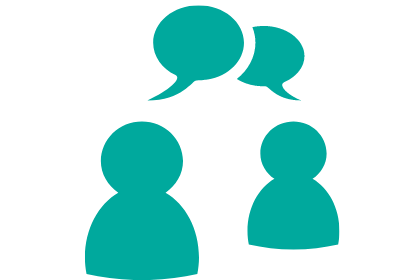A Speech and Language Therapist (SLT) plays an important role in supporting communication and swallow function in people diagnosed with various neurological conditions (from changes to the brain).

These can be progressive and change over time, such as Motor Neurone Disease (MND), Multiple Sclerosis (MS), Parkinson's Disease (PD) or Dementia, or the they can be non-progressive for example Stroke or Traumatic Brain Injury (TBI).
The SLT is involved in supporting people with neurological conditions, with the aim to improve and augment speech, language, communication and swallowing skills, in order to enhance the overall quality of life for people with neurological conditions and their families.
Communication is a two way process. It involves expression (message out) speaking, writing & gesture. It also involves comprehension (message in), understanding spoken & written information
Neurological conditions can impact people differently can result in a wide range of medical, physical, sensory, cognitive and communication difficulties.
Common symptoms that an SLT can help with include:
A Speech and Language Therapist can work with people to determine how Technology can be used to support communication. The term often used is Alternative Augmentative Communication (AAC). It can vary from using a simple piece of equipment for example, a voice amplifier to using a more complex communication system with many functions. Special communication software can be installed on smartphones, tablets or on a specialised electronic communication device. For example, there is software that allows you:
Working with a Speech and Language Therapist (SLT) is a positive step towards maximising your quality of life and living well with Parkinson’s Disease.
Supporting communication and swallowing of individuals with a range of neurological conditions such as Motor Neurone Disease, Dementia or Multiple Sclerosis.
Speech and language therapists assist children, adults and their families who are living with the impacts of acquired brain injury to set and work towards their best rehabilitation outcomes and to improve their quality of life.
Children and adults who for a number of reasons require augmentative and alternative communication (AAC) systems.
A stroke occurs when the blood flow to part of the brain is cut off. This can be caused by a blood clot or a burst blood vessel.
Aphasia is an acquired language difficulty that affects a person's ability to understand and/or use words, sentences and conversation
Motor Speech Disorders (MSD) are a group of speech and voice disorders that occur as a result of damage to the brain or other parts of the nervous system.
Working with an SLT is a positive step towards helping manage symptoms of MS & maximise confidence, well-being & quality of life
A Speech and Language Therapist helps people to address and compensate for communication changes; which can range from very mild to severe.